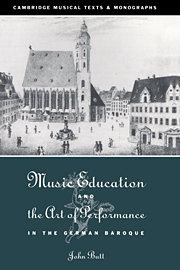Book contents
- Frontmatter
- Contents
- List of plates
- Preface
- Acknowledgements
- List of abbreviations
- 1 The establishment of Lutheran musical practice in the sixteenth century
- 2 The role of practical music in education c. 1600-1750
- 3 The contents, layout and style of instruction books
- 4 The development of performance practice and the tools of expression and interpretation in the German Baroque
- 5 Ornamentation and the relation between performer and composer
- 6 The decline of the Lutheran cantorates during the eighteenth century
- Notes
- Bibliography
- Index
1 - The establishment of Lutheran musical practice in the sixteenth century
Published online by Cambridge University Press: 03 December 2009
- Frontmatter
- Contents
- List of plates
- Preface
- Acknowledgements
- List of abbreviations
- 1 The establishment of Lutheran musical practice in the sixteenth century
- 2 The role of practical music in education c. 1600-1750
- 3 The contents, layout and style of instruction books
- 4 The development of performance practice and the tools of expression and interpretation in the German Baroque
- 5 Ornamentation and the relation between performer and composer
- 6 The decline of the Lutheran cantorates during the eighteenth century
- Notes
- Bibliography
- Index
Summary
Musical culture in Lutheran states was undoubtedly centred on churches and Latin schools during the sixteenth century; indeed the close bonds between these two institutions ensured the growth of musical practice for over a century to come. Music was hardly the key element in Luther's reforms, but his personal belief that it was the greatest gift of God, second only to theology itself, must have influenced many of the early reformers. That he saw music as intrinsically good and not just the servant of scriptural texts is evidenced by his love of Josquin's abstract polyphony and his remark that even bad fiddlers are good, since they enable us all the better to understand that which constitutes good music (WA Tischreden I, no. 968, p. 490). It is important to appreciate today that Luther's belief in the reality of the Devil was as strong as his belief in God, and that music was for him one of the principal antidotes to the Devil's work. The art was not just a useful adornment of liturgy and certainly not an object for aesthetic appreciation alone; it was both a powerful rhetorical medium – capable of influencing the listener in diverse, wonderful ways – and the embodiment of the metaphysical laws of God's creation. In the words of Friedrich Kalb, ‘Lutheranism is not driven to search for Biblical commands or prohibitions; for music is a spontaneous activity of life, inherent in God's creation, and needs no apology’ (Kalb 1965, p. 141).
- Type
- Chapter
- Information
- Publisher: Cambridge University PressPrint publication year: 1994



